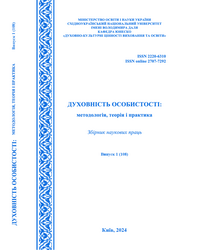METHODOLOGICAL ASPECTS OF STUDYING SPIRITUALITY
DOI:
https://doi.org/10.33216/2220-6310/2024-108-1-293-313Keywords:
spirituality, research methodology, religion, God, common good, consciousness, intelligence, collective intelligence, subconsciousness, sensory cognition, evolution, reductionism, integrity, physical foundations, informational approach, hierarchy of contextsAbstract
The article studies the concept of spirituality that remains relevant despite the progress of technology, in particular information technology. The study of this concept can be facilitated by the emergence of a number of new cognitive tools in science, in particular, cybernetics, systems theory, communication theory, synergetics, and even information theory in its classical and semantic concepts.
Several directions (and corresponding methods) in the study of spirituality are distinguished, related, in particular, to the gradual transition in the understanding of spirituality from faith in God to the primacy of “universal consciousness”, rational consciousness, and intelligence; with the claim of intelligence as a property of all humanity or a certain group of people; with reductionism, the desire to imagine the phenomena of consciousness and spirituality as stages of the evolution of the human brain, the biological and chemical bases of behaviour that exist in primitive species, even to derive them from the properties of elementary particles and laws of the microcosm, that is, the formation of the physical foundation of spirituality.
A specific problem is the generalization of the results in the study of spirituality by the methods of various sciences and the formation of a general understanding of it.
It is proved that the desire for reduction, formalization, scientific rigor, and unequivocalness in the listed directions does not lead to the disclosure of the concept of spirituality. Clarification of the mechanisms of its achievement (up to molecular, communication, and programmatic system models) is accompanied by the loss of the intuitively perceived essence of spirituality. Emphasis is placed on the perspective of the informational approach in the study of spirituality, taking into account its immaterial nature.
Objective problems of generalization of results in the study of spirituality are explained within the framework of the concept of the hierarchy of contexts presented by H. Bateson. Based on it, the relationship between the message and its context is not logical, but communicative in nature. Hence, the essence of spirituality can be revealed through reduction.

